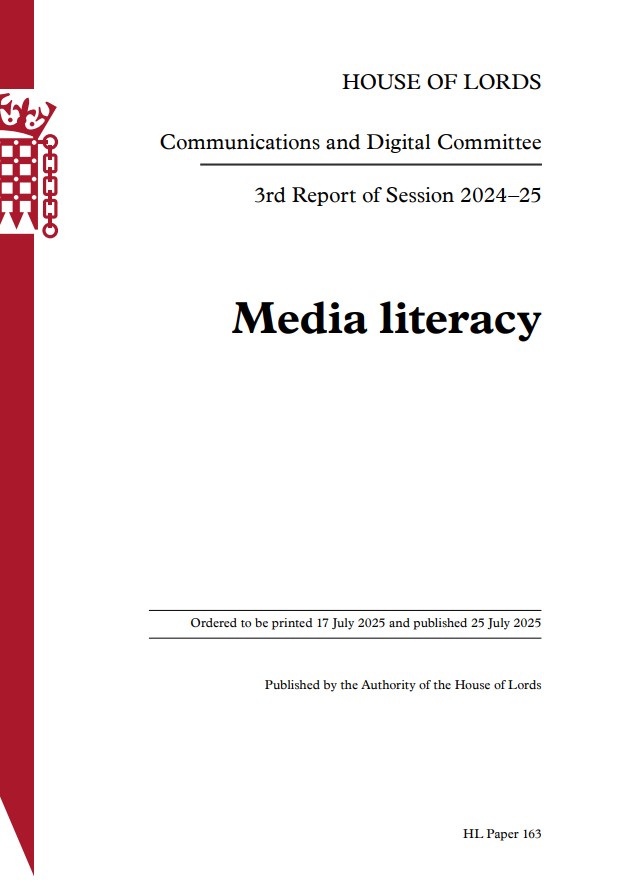by Martina Chapman, National Coordinator of Media Literacy Ireland
On 25 July, the House of Lords Communications and Digital Committee published a report summarising their inquiry into media literacy.
The report highlights the importance of media literacy and emphasises the need for the UK government to take urgent action to improve media literacy skills across the UK population. Acknowledging the current state of media literacy in the UK, it calls for a more sustained and strategic approach to address the challenges.
MLI National Coordinator, Martina Chapman, was one of the international experts to provide oral evidence at one of the early hearings, along with Leo Pekkala, Deputy Director of KAVI in Finland, Andy Demeulenaere, General Coordinator of Mediawijs in Belgium and Matthew Johnson, Director of Education for MediaSmarts in Canada.
The report notes that social cohesion is at risk and democracy itself is threatened by inadequate media literacy and makes the point that ‘Being media literate – having the skills to think critically about the content we create and consume, both online and offline – is essential’.
Recognising the role that media literacy has in empowering individuals and building resilience against harmful and misleading content, the reports expresses concern that the UK is ‘losing ground in equipping people to navigate an increasingly complex and diverse media and information environment adequately’ and notes that the UK has dropped down in international indices.
The report states that past initiatives have been scattered across departments, with limited join-up and no long-term strategic vision. While praising Ofcom’s work in this area and its three-year strategy, it also argues that Ofcom cannot deliver a comprehensive media literacy programme across the UK and calls for government leadership, driven by a specific, senior minister, to translate the regulator’s research on ‘what works’ into a more sustained, nationwide offering.
The report also notes that media literacy provision for both adults and children is patchy. Media literacy is not properly embedded in the national curriculum, with many teachers lacking the skills and confidence to deliver media literacy training to pupils.
Concern is also expressed about the challenges around media literacy provision for adults, such as lack of time, lack of awareness and overconfidence in existing skills, as well as the overreliance on underfunded third-sector organisations. The potential of libraries and other public services providers is noted but the report also acknowledges that these are already overstretched and under-resourced.
The report notes that, in the UK, technology platforms have no formal obligation to support media literacy calls for technology firms to play a greater part in funding independent efforts to enhance media literacy skills.
The action plan proposed in the report includes calls for ministerial buy-in, cross-departmental collaboration, local delivery and sector expertise, as well as specific reporting on this area. Specific recommendations include:
- Embed media literacy across the national curriculum
- Impose a levy on technology companies
- Address the leadership vacuum on media literacy delivery
- Raise public awareness and target support for adults.
The report summarises the findings of its enquiry into media literacy and complements the House of Commons Science, Innovation and Technology Committee’s recent work on social media, misinformation and harmful algorithms, which investigated the relationship between platforms’ algorithms, generative AI and the spread of false or harmful content.
The full report can be found here.
